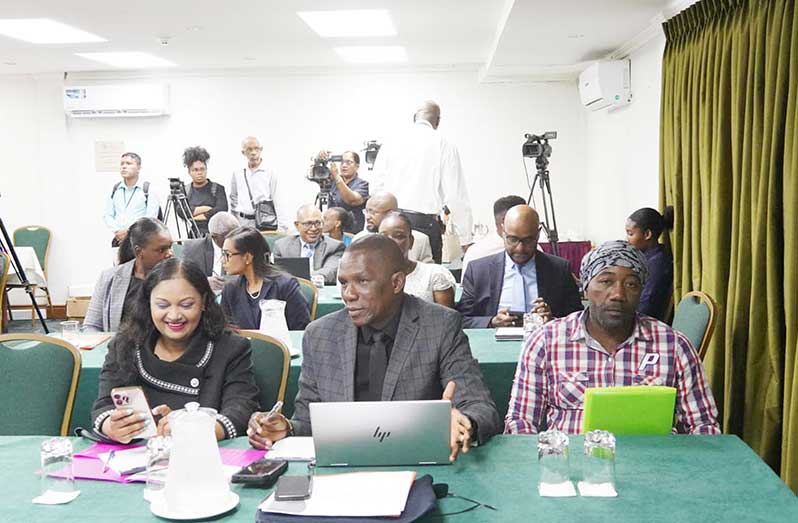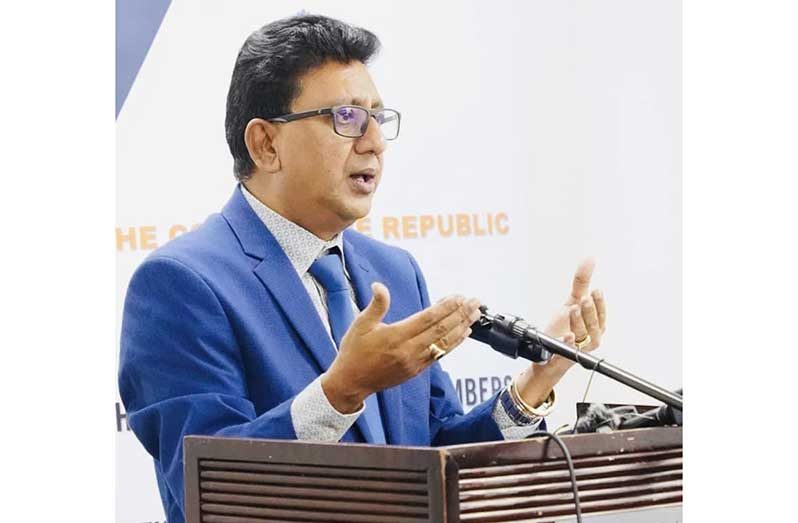MAGISTRATES from across Guyana are currently participating in a comprehensive training programmes on how to integrate restorative justice techniques into the judicial system.
The training, which began on Wednesday at the Cara Lodge Hotel in Georgetown, concludes today.
The initiative, supported by the Canadian-CARICOM Expert Deployment Mechanism (CCEDM), represents a collaborative effort to modernise the legal framework and improve the administration of justice.
According to the Government of Canada, restorative justice refers to “an approach to justice that seeks to repair harm by providing an opportunity for those harmed and those who take responsibility for the harm to communicate about and address their needs in the aftermath of a crime.”
Attorney-General and Minister of Legal Affairs, Anil Nandlall, SC, delivered the keynote address during which he emphasised the pivotal role magistrates play in shaping public perception of the justice system.
“You are perhaps the most important platform because it is with you that the public interacts the most,” he said to the magistrates.

He explained that restorative justice has been around for over half of a century, focuses on repairing harm caused by criminal behaviour by fostering dialogue between victims, offenders, and affected parties.
“It’s value to the criminal justice system is already established…”
He noted that it seeks to address the root causes of criminal actions, emphasising accountability and rehabilitation over retribution.
Highlighting the benefits of this approach, he said: “Restorative justice concentrates on bringing the victim and the offender together, trying to repair the relationship between the two persons. A conversation, an apology, just letting out the bad blood can be sufficient sometimes to address these problems that have existed for generations.”
He added that restorative justice applies to non-violent offences, such as minor interpersonal conflicts, which constitute a significant portion of cases in the magistrates’ courts.
By resolving such matters outside traditional court settings, Nandlall said that the judiciary can allocate resources more efficiently to complex cases requiring judicial intervention.
To support the integration of restorative justice, the government is in the process of establishing offices for restorative justice officers in all regions. These officers work alongside probation officers to address cases referred by magistrates.
“We added a restorative justice officer to the probation office,” Nandlall said, adding that this collaboration ensures that cases can be addressed holistically.
“The conventional methods of punishment, which we have tried in the world over the past 100 years, have simply not worked. We have tried the death penalty, the cat-o’-nine-tails, hard labour, solitary confinement, and other very punitive sanctions.
But have they resulted in a reduction in our crime statistics? No. In fact, our crime statistics show, horrifyingly, that they are increasing to such an extent that it is now accepted at the level of the Heads of State of CARICOM that crime is a public health issue,” the AG explained.
According to him, the restorative justice programme also addresses one of the judiciary’s pressing challenges: case backlogs. “Restorative justice kicks in at the police station, the Director of Public Prosecutions (DPP), and the court. So, it is a multi-layered system,” Nandlall said.
The AG noted that restorative justice has gained traction globally, with the United Nations (UN) advocating for its adoption in member states over two decades ago.
Regionally, he pointed out that the Caribbean Court of Justice (CCJ) has been a strong proponent of restorative practices. The 2023 “Needham’s Point Declaration” from the CCJ Academy of Law highlighted restorative justice as a cornerstone of modern legal systems in the Caribbean.
Guyana is at the forefront of implementing this paradigm, with legislative frameworks already in place in the form of the Restorative Justice Act of 2022.
Nandlall pointed out that restorative justice forms part of broader reforms, including the recently enacted Plea-Bargaining Act, Family Violence Act, and pending legislation on alternative sentencing. He therefore urged the judiciary to view restorative justice as a permanent fixture in Guyana’s legal landscape.
COMMENDABLE INITIATIVE
Meanwhile, the Chancellor of the Judiciary (ag), Justice Yonette Cummings-Edwards, lauded the initiative, noting its alignment with global trends toward alternative dispute resolution.
She stated that society often operates on the belief that individuals must be charged, locked away, and left to rot and suffer, with no chance of redemption.

As such, she noted that, “The Restorative Justice Act allows us to offer a better system in combatting crime in Guyana.”
She highlighted the importance of the restorative justice approach, which empowers victims, offenders, and the community to actively participate in the justice system, potentially reducing reoffending rates and fostering public trust.
Justice Cummings-Edwards explained that statistics indicate restorative practices significantly reduce reoffending rates.
She noted that these practices provide offenders with a better opportunity to reintegrate into society as productive citizens.
Additionally, she emphasised that restorative approaches help offenders comprehend the impact of their actions, making them less likely to harm others in the future.
According to her, the training is essential for judicial officers, including new magistrates, to understand and apply restorative justice principles effectively.
Tariq Williams, Senior International Assistance Officer at the Canadian High Commission to Guyana commended Guyana’s efforts, emphasising Canada’s commitment to supporting justice reforms across the Caribbean.
CCEDM has been instrumental in providing expertise and resources for the training and he pointed out that Canada has been a supporter of restorative justice and has contributed to its international recognition, including at the UN through resolutions like the 2002 UN Basic Principles on the Use of Restorative Justice Programs in Criminal Justice Systems.
“Our support for these initiatives is rooted in our belief that a fair and effective justice system is fundamental to the health of any society. We recognise that restorative justice can play a crucial role in reducing recidivism, alleviating the burden on our courts and fostering a culture of empathy and understanding.”
By supporting restorative justice efforts, he said Canada aims to contribute to the development of a justice system that is not only more humane but also more effective in achieving true justice. In Canada, restorative justice measures have been part of the country’s criminal justice system for over 40 years.
A Restorative Justice Centre has been established, led by a qualified director, Orrin Boston who will oversee the application of restorative justice as per the Restorative Justice Act, which was enacted in 2022.
The centre is located at Lot 341 East Street, South Cummingsburg, Georgetown.



.jpg)








